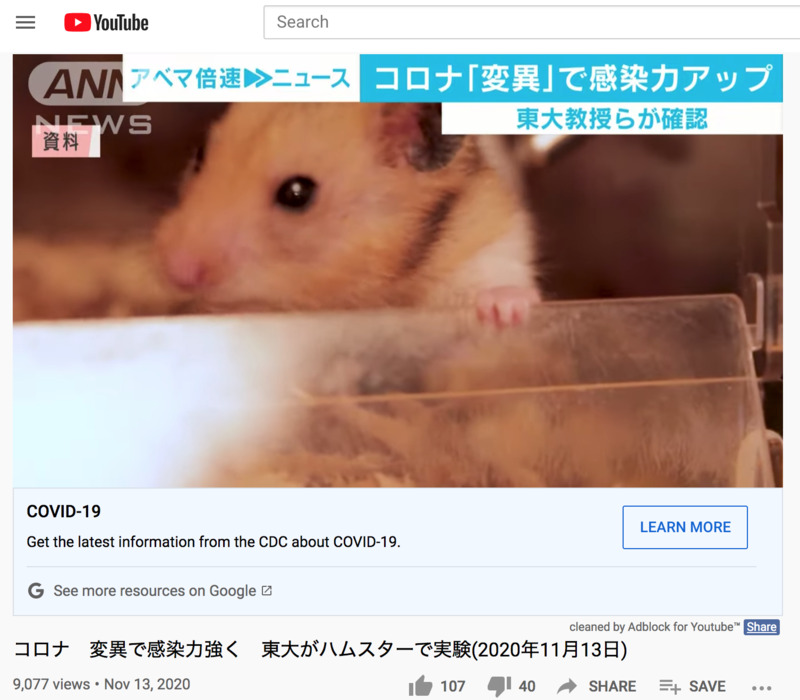Elemento
コロナ 変異で感染力強く 東大がハムスターで実験(2020年11月13日) - Corona mutation strongly infectious University of Tokyo experimented with hamster (November 13, 2020)
Título (Dublin Core)
コロナ 変異で感染力強く 東大がハムスターで実験(2020年11月13日) - Corona mutation strongly infectious University of Tokyo experimented with hamster (November 13, 2020)
Description (Dublin Core)
新型コロナウイルスが変異したことで感染力が強まったことを確認したということです。
東京大学医科学研究所の河岡義裕教授は新型コロナウイルスが変異したことで感染力が強まったと発表しました。変異はD614Gと呼ばれ、ウイルスの表面にある突起部分で起きたもので、変異の前よりも細胞に結合しやすくなったということです。河岡教授はハムスターなどを使った実験で変異したウイルスが従来のウイルスよりも飛沫(ひまつ)感染しやすいことを確認しました。現在、世界で蔓延(まんえん)しているのはこの変異ウイルスですが、変異前のウイルスをもとに作ったワクチンも効果が期待されるとしています。
It was confirmed that the infectivity of the new coronavirus was strengthened by the mutation.
Professor Yoshihiro Kawaoka of the Institute of Medical Science, the University of Tokyo, announced that the mutation of the new coronavirus increased the infectivity. The mutation, called D614G, occurs in a protrusion on the surface of the virus (Spikes), which means that it is easier to bind to cells in humans than it was before the mutation. Professor Kawaoka confirmed in experiments using hamsters, hamsters with mutated version of viruses are more susceptible to droplet (himatsu) infection than hamsters with conventional viruses. Currently, it is this mutant virus that is widespread in the world, but it is expected that vaccines made based on the virus before mutation will also be effective.
Video translated by Youngbin Noh
東京大学医科学研究所の河岡義裕教授は新型コロナウイルスが変異したことで感染力が強まったと発表しました。変異はD614Gと呼ばれ、ウイルスの表面にある突起部分で起きたもので、変異の前よりも細胞に結合しやすくなったということです。河岡教授はハムスターなどを使った実験で変異したウイルスが従来のウイルスよりも飛沫(ひまつ)感染しやすいことを確認しました。現在、世界で蔓延(まんえん)しているのはこの変異ウイルスですが、変異前のウイルスをもとに作ったワクチンも効果が期待されるとしています。
It was confirmed that the infectivity of the new coronavirus was strengthened by the mutation.
Professor Yoshihiro Kawaoka of the Institute of Medical Science, the University of Tokyo, announced that the mutation of the new coronavirus increased the infectivity. The mutation, called D614G, occurs in a protrusion on the surface of the virus (Spikes), which means that it is easier to bind to cells in humans than it was before the mutation. Professor Kawaoka confirmed in experiments using hamsters, hamsters with mutated version of viruses are more susceptible to droplet (himatsu) infection than hamsters with conventional viruses. Currently, it is this mutant virus that is widespread in the world, but it is expected that vaccines made based on the virus before mutation will also be effective.
Video translated by Youngbin Noh
Date (Dublin Core)
November 13, 2020
Creator (Dublin Core)
ANNnewsCH
Contributor (Dublin Core)
Youngbin Noh
Event Identifier (Dublin Core)
HSE
Partner (Dublin Core)
Arizona State University
Tipo (Dublin Core)
Screenshot, video
Link (Bibliographic Ontology)
Controlled Vocabulary (Dublin Core)
English
Health & Wellness
English
Public Health & Hospitals
English
News coverage
English
Science
Curator's Tags (Omeka Classic)
Japan
hamster
experiment
virus structure
mutate
infection
Contributor's Tags (a true folksonomy) (Friend of a Friend)
Japan
hamsters
experiment
virus structure
Linked Data (Dublin Core)
Date Submitted (Dublin Core)
11/13/2020
Date Modified (Dublin Core)
03/06/2021
03/12/2021
Date Created (Dublin Core)
11/13/2020
This item was submitted on November 13, 2020 by Youngbin Noh using the form “Share Your Story” on the site “A Journal of the Plague Year”: http://mail.covid-19archive.org/s/archive
Click here to view the collected data.

